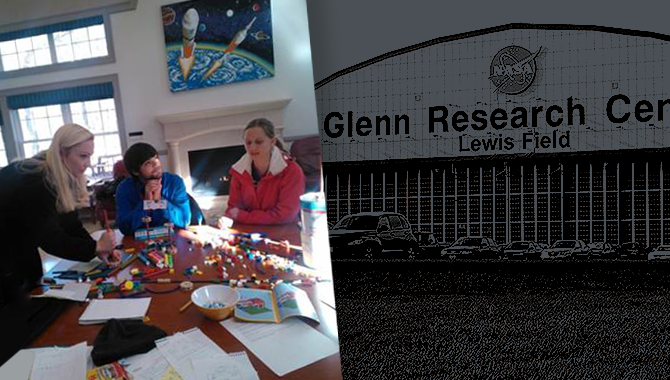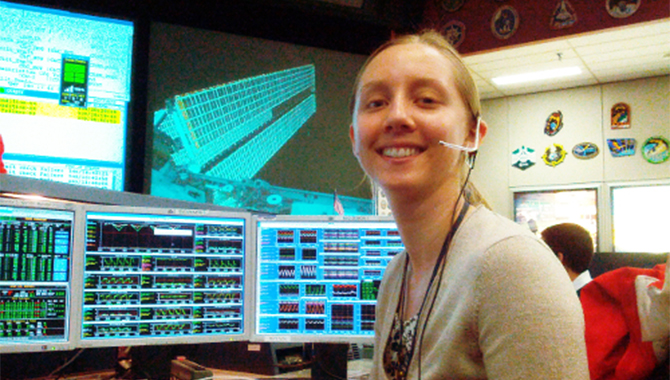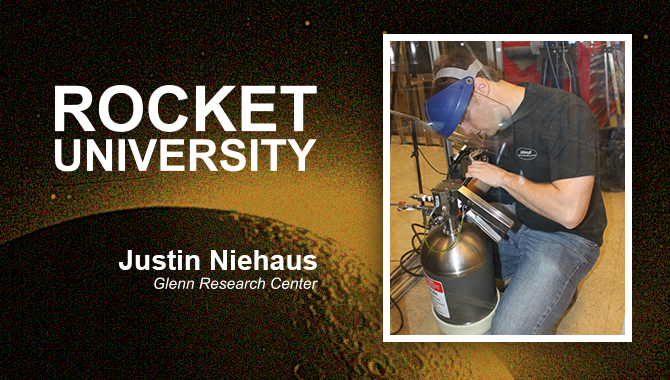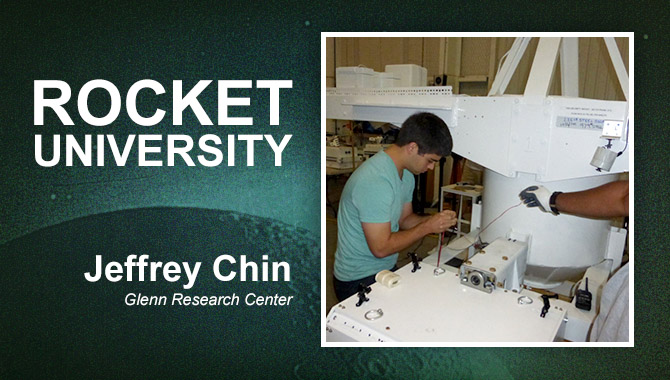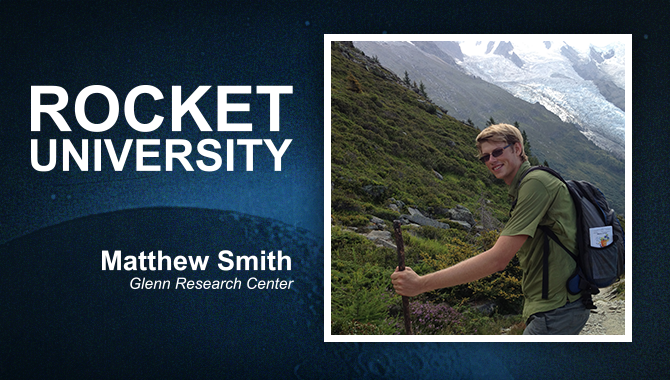
A love of systems thinking brought Matthew Smith to Glenn Research Center. Now GRC’s Rocket University program is letting him apply that thinking to a full project lifecycle.
In November 2013, Glenn Research Center launched its pilot Rocket University (“Rocket U”) program. Designed to give early-career Glenn employees hands-on project experience throughout the full lifecycle of a flight project, the program seeks to develop the next-generation workforce as they transition into higher-profile projects. APPEL News recently spoke with reliability analyst Matthew Smith, a member of GRC’s Rocket U program, to find out how Rocket U is impacting his career path at NASA.
APPEL News: Tell us a bit about yourself. What do you do at NASA?
Matthew Smith: I’m part of the Reliability & Systems Safety Engineering Branch here at the Glenn Research Center. My day job involves supporting a variety of projects in ensuring mission success and safety. I use different tools to help project teams walk through their designs and analyze the effects of potential failures. Once we’ve done that, we try to identify design changes or other mitigation strategies. One of the cool things about what I do, especially for someone who only graduated recently, is that I get to put my eyes on a bunch of different projects.
APPEL News: Is this what you’ve dreamed of doing since you were a little kid?
Smith: I think I probably diverge from a lot of the people who work at NASA because it wasn’t like I was a 9-year-old kid who knew, “I want to be a NASA engineer!” I had a circuitous route here. I didn’t do an internship or a co-op with NASA during school. But at the University of Maryland, where I got my degree in mechanical engineering, I was heavily involved, through projects or extracurriculars, in looking at the systems aspect of engineering problems. And that’s what attracted me to this position at NASA. The Reliability & Systems Safety Engineering Branch at Glenn had that sort of systems thinking that I really enjoyed at school. So when the opportunity came up, I applied. And here I am.
APPEL News: You’ve been at Glenn for just under a year now. How does Rocket U fit into your work life? Does it interfere with your day job or support it?
Smith: I think the only challenge is some of the four- or five-day classes, which can be difficult to fit around my regular duties. But ordinarily, whenever I have a spare moment, I can try to sit down and do some Rocket U work. Everyone I work with at the project level and my supervisors have been very understanding. I’m really appreciative of that.
Also, one of the things about Rocket U is that it’s helping me get up to speed with NASA procedures and with understanding how NASA goes about the lifecycle of their projects. And a lot of the APPEL classes are great. That’s one of the nicest things about Rocket U. Even though I’ve been very well supported by my branch in taking classes, without Rocket U I don’t know whether those classes would have come to my center—at least, within the same timeframe. It might have been another year or six months before, say, a requirements class came to the center.
Another thing I really like about Rocket U is that it provides a great opportunity to meet people who are subject matter experts in their fields. I mean, there are networking opportunities here at the center, but not as many professional networking opportunities. That’s something Rocket U does a great job with. I think it’s a tremendous advantage. It wasn’t something I fully realized when I signed up for the program.
APPEL News: What were you thinking when you signed up for Rocket U?
Smith: When I signed up, I was thinking that since a lot of my day job involves analyzing systems but not doing design work, I was hoping I’d be able to do some of that design work myself.
Also, I see the upfront end of a project in my day job. I get involved in the design aspect, and once that’s done, reliability usually gets phased out. So, as a reliability analyst, I typically only see the beginning of a project. With Rocket U, I was hoping to experience the full project lifecycle. You can learn a lot about how you should do things at the beginning by seeing how something is operated at the end.
APPEL News: Have you gotten to do any design work for your Rocket U project yet?
Smith: We’re still in the very early stages of our project, so we haven’t done much design work. But I have gotten to help lay the foundation for the project. Like, what’s our concept of operations, what’s the overall architecture, what kinds of things do we want or hope to achieve, and how will we achieve them? So I’m definitely getting that experience.
I’m also enjoying the technical classes. We had a workshop on scientific computing using Python, which was nice, and another one on the computer aided design (CAD) package that NASA uses, which I have a fair level of familiarity with but haven’t used in 11 months or so, so it was good to get a refresher. Also, our group had the opportunity to have a two-day workshop with an external group that assists small businesses in doing manufacturing. I have some experience in rapid prototyping, but it was very nice to go through and have a refresher on various manufacturing techniques. Not all of them can be applied to our project, but to me, as a mechanical engineer and also someone who’s interested in the design aspect, exploring design for manufacturing is very interesting.
APPEL News: So even if some of what you’re doing through Rocket U doesn’t directly affect your project, it could benefit your career?
Smith: Yes, I think so. Let me put it this way: if everything [with Rocket U] were to stop today, I would still be satisfied. We’ve already gotten significant professional and personal development out of it.
APPEL News: Can you share any specifics about your Rocket U project with us?
Smith: One of the requirements for our Rocket U project—this goes way back to the beginning—was to select a project that related to an existing center project. Currently, there’s a project at the center called the Gondola for High Altitude Planetary Science, or GHAPS. They’re looking at reusability in balloon gondolas for performing observational missions using a telescope at high altitude. In our conversations with the design team for GAPS, they identified mitigation of landing loads as an area where they’re interested in seeing some sort of novel approach.
We took that idea and ran with it. So our project is looking at developing what amounts to an intelligent airbag system. It’s similar to the system in your car that knows which airbag to deploy when you get into an accident. What we’re looking at is investigating what sort of mitigation we can get from the landing loads by using an airbag system. In doing this, we’re trying to develop our system so that if the payload comes down at an angle, or tumbles upon impact, the appropriate airbags deploy to protect the payload, but you don’t have all the airbags deploy. Because we’re looking at the reusability aspect: if you don’t have to deploy an airbag, don’t.
APPEL News: Is everything on track for your project?
Smith: In the last two weeks we’ve determined that we’re not going to be able to achieve our secondary “stretch” goal. That would have been working with a company called Airborne Systems to do a guided parafoil. That’s a way you can make a landing softer and help your reusability aspect by controlling where you land so you’re not landing in a crevasse or in a rocky riverbed. You can more accurately target, maybe near a place you identified as easy to access, so you can pick up your payload a little more easily. But for budgetary and scheduling reasons, we weren’t able to do it. We’re keeping it on the back burner as maybe a cool idea for another Rocket U group.
One of the major learning experiences was that until about two and half or maybe three weeks ago, we didn’t have a full idea of the cost. Doing due diligence on the costs was definitely a learning experience. I think it was really valuable. Even though it didn’t pan out, we still got to run through the exercise of pricing out a project’s budget, looking at the scheduling, and finding out: would we actually be able to do this? Unfortunately, the answer was no. But that happens sometimes.
APPEL News: Have you faced any other challenges with the project so far?
Smith: I would say the biggest challenge is learning how we want to apply everything we’ve been taught in our classes or seen in other projects. That organizational aspect has been the biggest challenge so far: how to organize ourselves in terms of responsibilities and roles. The thing is, in our day jobs, we’re pretty much assigned tasks and it’s pretty clear what we need to do. We have someone to report to, and that person reports to someone else. With Rocket U, it was a challenge to create our own system of understanding how we’re going to organize ourselves. Because one of the common goals of the team has been to try things that we don’t have any specific training or real expertise for. It’s been interesting to come up with a way to rotate responsibilities so that everyone has a chance to try their hand at something and push themselves a little bit.
APPEL News: How have you handled that challenge?
Smith: We came up with a team charter and a project management team idea about when we would rotate roles, how many people should be on the team, and what the process was for selection. We just ironed out our WBS, our Work Breakdown Structure. But just because someone is assigned a role, it doesn’t mean they’re the only person doing that thing—in fact, it shouldn’t mean that. It simply means we’re establishing points of contact. Now that our design and project are starting to flesh out a little bit in terms of technical aspects, it’s important to have those roles defined.
APPEL News: What has your role on the project been so far?
Smith: I’ve been helping a lot with the preparation for the System Requirements Review, the SRR; writing requirements, figuring out what the overall architecture of our system is going to be. For a while I was the default Safety & Mission Assurance liaison, but that responsibility has been passed off to someone else. Now I’m working with Jeremiah McNatt, another one of our Rocket U team members, as essentially the co-lead for mission and vehicle operation. So, for example, if we were to drop our payload from a crane to simulate it coming down from a parachute, we’d organize getting the crane, designing the experiments, figuring out what height we need to drop it from, the orientation we’d need. During the actual test, Jeremiah and I would be responsible for saying—okay, are we collecting the data we want to, are we ready to go, is everyone in the appropriate place?
Operations has always been something I’ve enjoyed. Operations and planning. So this role allows me to do that and also simultaneously work with the other leads in doing some of the design work as I have availability and as the work comes up.
It’s probably come across already, but I’m not lacking in things that interest me at Rocket U. If anything, there are probably too many things…and I prefer it that way.
APPEL News: What have you loved most about Rocket U?
Smith: I would struggle to summarize it in one sentence. But I’ve really enjoyed the opportunity to push myself and take classes that I ordinarily would not, and to interact with people across the center and also in our group. [Without Rocket U] I probably would not have had these opportunities in my career for a long time.
APPEL News: Is there anything we haven’t asked you that you’d like to add?
Smith: I just want to thank everyone at APPEL for the tremendous level of support. Despite the Rocket U program being new here at Glenn, I would say that we’re already reaping the rewards of it. It’s already paying off in my career. I would not feel remiss in speaking for my fellow Rocket U members in saying that all of us are getting a tremendous amount out of the program. And I’ve really enjoyed the level of support I’ve gotten all across the center and even across NASA, because we’ve had the opportunity to talk to a couple of people outside of our center. It’s been great.
Learn more about Rocket University.
Matthew Smith, reliability analyst, is a member of the pilot Rocket U program at Glenn Research Center.
Featured Photo Credit: Photo courtesy of Matthew Smith






